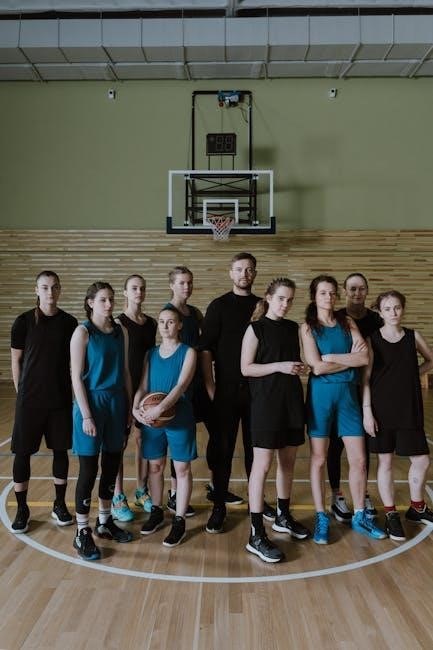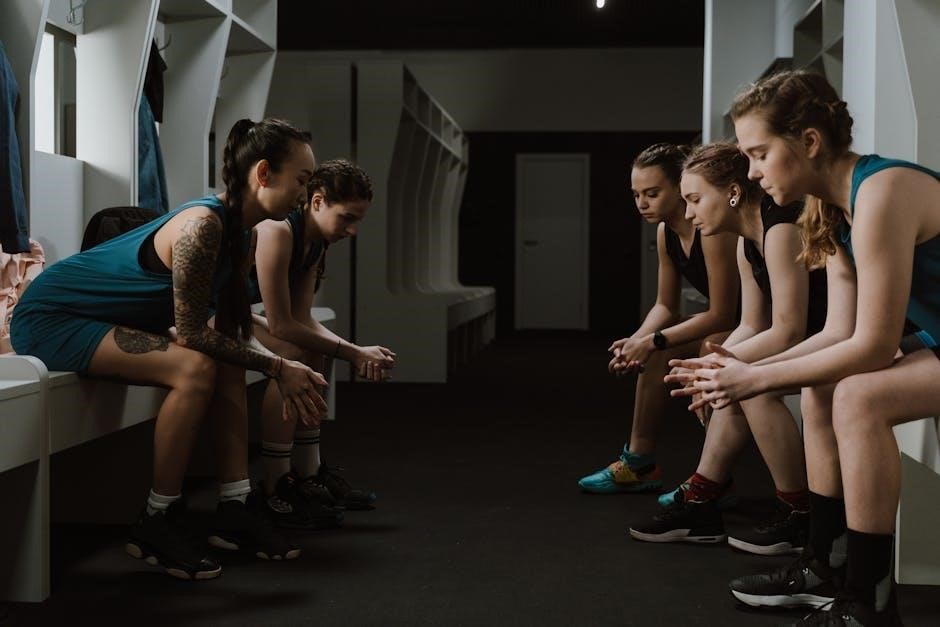
mental toughness for young athletes pdf
Mental toughness is a crucial attribute for young athletes‚ enabling them to perform at their best‚ overcome challenges‚ and maintain resilience under pressure. It combines confidence‚ focus‚ and emotional control‚ essential for both training and competition. Cultivating mental toughness helps athletes navigate setbacks‚ build determination‚ and achieve their full potential. Resources like the Mental Toughness for Young Athletes PDF provide practical strategies and mindset exercises to foster this vital quality.
1.1 Defining Mental Toughness
Mental toughness refers to an athlete’s ability to remain focused‚ resilient‚ and composed under pressure. It encompasses confidence‚ perseverance‚ and emotional stability‚ enabling young athletes to navigate challenges and setbacks effectively. This concept‚ highlighted in resources like the Mental Toughness for Young Athletes PDF‚ involves maintaining a positive mindset and bouncing back from failures. It’s not just about physical skill but also about psychological strength‚ which is critical for peak performance and personal growth in sports.
1.2 The Importance of Mental Toughness in Sports
Mental toughness is vital for young athletes to achieve peak performance and excel in competitive sports. It helps them manage pressure‚ overcome setbacks‚ and maintain focus during critical moments. As highlighted in the Mental Toughness for Young Athletes PDF‚ mentally tough athletes are more resilient‚ exhibit better emotional control‚ and consistently deliver high-quality performances. This quality not only enhances athletic success but also fosters personal growth‚ teaching perseverance and confidence. By developing mental toughness‚ young athletes can better handle the demands of sports‚ adapt to challenges‚ and push their limits‚ ultimately reaching their full potential both on and off the field.
1.3 The Role of Mental Toughness in Achieving Athletic Excellence
Mental toughness is a cornerstone for achieving athletic excellence‚ enabling young athletes to push their limits and perform consistently at high levels. It empowers them to stay focused‚ composed‚ and motivated‚ even in the face of adversity. As highlighted in the Mental Toughness for Young Athletes PDF‚ mentally tough athletes are better equipped to overcome setbacks‚ adapt to challenges‚ and maintain their drive. This quality fosters resilience‚ allowing athletes to rebound from failures and learn from mistakes. By cultivating mental toughness‚ young athletes can unlock their full potential‚ outperform competitors‚ and achieve long-term success in their sports careers. It is the mental edge that separates good athletes from exceptional ones.

Understanding the Concept of Mental Toughness
Mental toughness refers to an athlete’s ability to overcome obstacles‚ maintain focus‚ and perform optimally under pressure. It encompasses resilience‚ confidence‚ and emotional control‚ enabling athletes to thrive in challenging situations.
2.1 Historical Perspectives on Mental Toughness
The concept of mental toughness has evolved over decades‚ with early studies focusing on its role in overcoming adversity and achieving peak performance. Pioneers in sports psychology‚ such as James Loehr‚ explored mental toughness in the 1980s‚ emphasizing its importance in athletic success. Historical research highlighted traits like resilience‚ focus‚ and emotional control as key components. Early definitions often linked mental toughness to an athlete’s ability to perform under pressure and recover from setbacks. These foundational ideas have shaped modern understanding‚ with researchers continually refining the concept to better support young athletes. Historical perspectives underscore the timeless relevance of mental toughness in sports and its adaptability to new challenges.
2.2 Key Components of Mental Toughness
Mental toughness encompasses several core components that enable athletes to excel under pressure. Resilience is a fundamental aspect‚ allowing individuals to bounce back from setbacks and maintain motivation. Self-belief and confidence are critical‚ as they empower athletes to trust their abilities and make decisive actions. Emotional control ensures stability in high-stress situations‚ preventing negative emotions from hindering performance. Focus and concentration enable athletes to maintain awareness and adapt to dynamic environments. Additionally‚ goal-setting and a growth mindset foster determination and continuous improvement. Together‚ these components create a robust framework that supports young athletes in overcoming challenges and achieving their potential. Understanding these elements is essential for developing effective mental toughness strategies.
2.3 The Relationship Between Mental Toughness and Athletic Performance
Mental toughness significantly influences athletic performance by enhancing an athlete’s ability to remain focused‚ resilient‚ and composed under pressure. Research indicates that mentally tough individuals consistently outperform their peers‚ as they can better manage stress and maintain emotional stability. This quality enables athletes to execute skills effectively‚ even in challenging situations. For instance‚ studies on young soccer players reveal that mental toughness predicts superior performance and adaptability. Additionally‚ mentally tough athletes exhibit greater perseverance‚ which is critical in achieving long-term success; By fostering mental toughness‚ young athletes can optimize their physical abilities and unlock their full potential‚ making it a cornerstone of athletic excellence and personal growth.

Developing Mental Toughness in Young Athletes

Mental toughness in young athletes is cultivated through a blend of psychological traits like resilience and confidence‚ supported by a nurturing environment and guided by effective coaching strategies and mindset exercises.
3.1 The Role of Psychological Traits in Mental Toughness
Psychological traits such as resilience‚ confidence‚ and focus play a pivotal role in fostering mental toughness among young athletes. These traits enable athletes to navigate challenges‚ maintain composure under pressure‚ and stay motivated. Resilience helps athletes rebound from setbacks‚ while confidence builds determination and self-belief. Focus ensures sustained concentration‚ even during high-stakes situations. Additionally‚ positive self-talk and emotional regulation are critical‚ as they influence an athlete’s mindset and performance. Research highlights that these psychological traits are foundational for mental toughness‚ empowering athletes to push beyond their limits and achieve excellence. By nurturing these qualities‚ young athletes can develop the mental fortitude needed to excel in sports and beyond.
3.2 Environmental Factors Influencing Mental Toughness
Environmental factors significantly influence the development of mental toughness in young athletes. A supportive and challenging environment fosters resilience and confidence. Parents‚ coaches‚ and peers play pivotal roles in shaping an athlete’s mindset. Positive reinforcement‚ constructive feedback‚ and exposure to pressure situations help build mental fortitude. Additionally‚ cultural and societal expectations can impact an athlete’s ability to cope with stress and adversity. Research indicates that environments promoting growth mindsets and emotional regulation enhance mental toughness. Tools like the MTQ18 questionnaire can assess how these factors contribute to an athlete’s psychological profile. By understanding these influences‚ caregivers can create optimal conditions for young athletes to thrive mentally and emotionally‚ as highlighted in resources like the Mental Toughness for Young Athletes PDF.
3.3 The Impact of Coaching on Mental Toughness Development
Coaches play a pivotal role in nurturing mental toughness in young athletes. Effective coaching strategies‚ such as mindset exercises‚ resilience training‚ and positive reinforcement‚ help athletes develop emotional control and confidence. Coaches who foster a growth mindset and provide constructive feedback create an environment where athletes can embrace challenges and learn from setbacks. Research highlights that athlete-centered training programs‚ as outlined in resources like the Mental Toughness for Young Athletes PDF‚ empower coaches to tailor interventions that enhance mental resilience. By modeling and teaching mental toughness‚ coaches not only improve athletic performance but also equip young athletes with life-long psychological strengths‚ enabling them to thrive under pressure and adversity.

Practical Training Methods for Mental Toughness
Practical methods include mindset exercises‚ resilience training‚ and mindfulness techniques. These strategies‚ detailed in the Mental Toughness for Young Athletes PDF‚ enhance focus‚ emotional control‚ and performance under pressure.
4.1 Mindset Exercises for Young Athletes
Mindset exercises are essential for building mental toughness in young athletes. These exercises‚ detailed in the Mental Toughness for Young Athletes PDF‚ focus on improving focus‚ confidence‚ and emotional control. Techniques include visualization‚ positive self-talk‚ and goal-setting. For instance‚ athletes can practice visualizing successful performances to boost confidence. Additionally‚ teaching young athletes to replace negative self-talk with positive affirmations helps build resilience. The PDF also emphasizes quick‚ 5-minute exercises that can be easily incorporated into daily routines. These strategies‚ backed by research from authors like Troy Horne‚ help young athletes develop a growth mindset‚ enabling them to thrive under pressure and overcome challenges. Such exercises are crucial for fostering mental toughness and long-term success in sports.
4.2 The Role of Resilience in Mental Toughness Training
Resilience is a cornerstone of mental toughness‚ enabling young athletes to bounce back from setbacks and maintain performance under pressure. According to the Mental Toughness for Young Athletes PDF‚ resilience training helps athletes develop coping strategies and adaptive thinking. Techniques such as reframing challenges as opportunities and practicing emotional regulation are emphasized. Research by Strycharczyk et al. (2021) highlights resilience as a key predictor of athletic success. By fostering resilience‚ young athletes can manage stress‚ maintain focus‚ and stay motivated during difficult times. These skills‚ cultivated through targeted exercises‚ are vital for long-term growth and success in sports‚ as they empower athletes to overcome obstacles and thrive in competitive environments.
4.3 Incorporating Mindfulness and Stress Management Techniques

Mindfulness and stress management are essential components of mental toughness training for young athletes. These practices help athletes stay present‚ manage anxiety‚ and maintain emotional balance under pressure. Techniques such as deep breathing‚ visualization‚ and guided meditation can enhance focus and reduce stress. The Mental Toughness for Young Athletes PDF highlights the importance of these practices in building resilience and improving performance. By incorporating mindfulness exercises‚ athletes can better regulate their emotions and respond to challenges with clarity. Stress management strategies also teach athletes to view pressure as an opportunity rather than a threat‚ fostering a growth mindset. These tools are vital for developing the mental strength needed to excel in competitive sports and beyond.

Assessing Mental Toughness in Young Athletes
Evaluating mental toughness involves tools like the MTQ18 questionnaire‚ which measures resilience‚ confidence‚ and emotional control. These assessments help identify strengths and areas for growth‚ guiding tailored development strategies to enhance performance under pressure.
5.1 The Mental Toughness Questionnaire (MTQ18)
The Mental Toughness Questionnaire (MTQ18) is a widely used‚ 18-item assessment tool designed to measure key components of mental toughness in athletes. Developed by researchers‚ it evaluates four core dimensions: resilience‚ life control‚ emotional control‚ and confidence. The questionnaire provides insights into an athlete’s ability to perform under pressure‚ cope with adversity‚ and maintain focus. By identifying strengths and areas for improvement‚ the MTQ18 helps coaches and psychologists tailor development programs. Its reliability and validity make it a valuable resource for assessing mental toughness in young athletes‚ enabling targeted interventions to enhance performance and overall resilience.
5.2 Understanding Athletes’ Perceptions of Mental Toughness
Athletes’ perceptions of mental toughness play a crucial role in how they approach challenges and perform under pressure. Research indicates that many young athletes view mental toughness as a blend of resilience‚ confidence‚ and emotional stability. These perceptions are shaped by personal experiences‚ training environments‚ and interactions with coaches and peers. Athletes who associate mental toughness with positive traits like focus and determination tend to perform better and adapt more effectively to adversity. Conversely‚ negative perceptions may hinder progress. Understanding these perspectives is vital for tailoring development strategies‚ as aligning training methods with athletes’ beliefs can enhance engagement and effectiveness. This alignment fosters a stronger connection between mental toughness concepts and practical application in sports.
5.3 Measuring the Impact of Mental Toughness on Performance
Evaluating the impact of mental toughness on performance is essential to understanding its role in athletic success. Tools like the Mental Toughness Questionnaire (MTQ18) provide insights into an athlete’s psychological traits‚ such as resilience and confidence. Studies show that higher mental toughness scores correlate with better performance under pressure and adaptability to challenges. By analyzing these metrics‚ coaches and psychologists can identify areas for improvement and tailor training programs. Additionally‚ observing athletes’ ability to maintain focus and composure during competitions offers practical evidence of mental toughness in action. This dual approach—combining quantitative assessments with real-world observations—provides a comprehensive understanding of how mental toughness influences athletic outcomes and informs strategies to enhance it.

The Role of Parents in Fostering Mental Toughness
Parents play a vital role in nurturing mental toughness in young athletes by providing emotional support‚ encouraging resilience‚ and modeling positive behaviors. Their influence shapes confidence and perseverance‚ helping athletes thrive under pressure and achieve their potential.
6.1 Parental Influence on Athletes’ Mental Development
Parents significantly influence the mental development of young athletes by fostering resilience‚ confidence‚ and emotional control. Their support and encouragement help build a strong mindset‚ enabling athletes to cope with pressure and setbacks. Positive reinforcement and open communication create a nurturing environment where athletes can grow. Parents who model mental toughness themselves inspire their children to adopt similar traits. Additionally‚ providing access to resources like the Mental Toughness for Young Athletes PDF equips parents with practical strategies to guide their children effectively. By emphasizing effort over outcomes and teaching life skills‚ parents play a pivotal role in shaping their athletes’ mental strength and overall development.
6.2 Practical Strategies for Parents to Enhance Mental Toughness
Parents can enhance mental toughness in young athletes through specific strategies. Encouraging a growth mindset‚ setting realistic goals‚ and promoting self-reflection are key. Teaching resilience by focusing on effort rather than outcomes helps athletes embrace challenges. Positive reinforcement and constructive feedback foster confidence and emotional control. Parents should also model mental toughness themselves‚ demonstrating perseverance and positivity. Utilizing resources like the Mental Toughness for Young Athletes PDF provides structured exercises and insights. Creating a supportive environment where failure is seen as a learning opportunity further strengthens an athlete’s mental foundation. These practices help parents empower their children to thrive both on and off the field.
6.3 The Importance of Positive Reinforcement
Positive reinforcement is a powerful tool for fostering mental toughness in young athletes. By acknowledging and celebrating their efforts‚ progress‚ and perseverance‚ parents and coaches can build confidence and resilience. This approach helps athletes develop a growth mindset‚ viewing challenges as opportunities for improvement rather than failures. Positive reinforcement also strengthens emotional stability‚ enabling athletes to maintain focus under pressure. It encourages self-belief and determination‚ which are critical for overcoming setbacks. Resources like the Mental Toughness for Young Athletes PDF emphasize the value of positive reinforcement in creating a supportive environment that nurtures mental strength. Consistent encouragement helps athletes stay motivated and resilient‚ both in sports and life.

Case Studies and Real-Life Applications
Case studies highlight how young athletes apply mental toughness in real-life scenarios‚ overcoming setbacks and excelling in high-pressure situations. Examples from sports like soccer and basketball illustrate resilience and focus‚ demonstrating how mental strength translates to success. The Mental Toughness for Young Athletes PDF provides practical insights and inspiring stories‚ showing how these qualities are cultivated and applied effectively.
7.1 Successful Athletes Who Exemplify Mental Toughness
Successful athletes like Patrick Mahomes and elite soccer players demonstrate exceptional mental toughness‚ overcoming adversity and excelling under pressure. These individuals showcase resilience‚ focus‚ and determination‚ key qualities highlighted in the Mental Toughness for Young Athletes PDF. Their ability to stay composed during high-stakes moments and bounce back from setbacks illustrates the power of mental strength. By studying these examples‚ young athletes can learn how to emulate such traits‚ fostering their own mental resilience. These real-life applications provide inspiration and practical insights‚ proving that mental toughness is a cornerstone of athletic success and personal growth.
7.2 Overcoming Setbacks and Bottlenecks in Sports
Overcoming setbacks and bottlenecks is a critical aspect of mental toughness for young athletes. Setbacks‚ such as injuries or poor performance‚ are inevitable in sports‚ but it is how athletes respond that defines their resilience. The Mental Toughness for Young Athletes PDF emphasizes the importance of developing a growth mindset to view challenges as opportunities for growth. Strategies like reframing negative thoughts‚ focusing on controllable factors‚ and maintaining emotional balance are essential. These techniques help athletes navigate difficulties‚ rebuild confidence‚ and stay motivated. By learning to embrace adversity‚ young athletes can transform setbacks into stepping stones for success‚ fostering mental resilience and perseverance that benefits both their athletic and personal lives.
7.3 Mental Toughness in Extreme Sports
Mental toughness is paramount in extreme sports‚ where athletes face high risks and unpredictable environments. These sports demand exceptional focus‚ fear management‚ and quick decision-making. The Mental Toughness for Young Athletes PDF highlights strategies like visualization and mindfulness to maintain composure under pressure. Techniques such as controlled breathing help athletes stay calm and make rational decisions in high-stakes situations. This mental resilience not only enhances performance but also contributes to safer practices‚ allowing athletes to push limits while minimizing risks. The PDF underscores how these strategies foster resilience‚ enabling young athletes to excel in extreme sports by mastering their mental game. Such mental fortitude is key to overcoming the unique challenges of these demanding activities.

The Future of Mental Toughness Training
The future of mental toughness training lies in integrating technology‚ personalized approaches‚ and holistic development. Innovations like AI and VR aim to enhance resilience and performance.
8.1 Emerging Trends in Mental Toughness Development
Emerging trends in mental toughness development emphasize technology-enhanced training and personalized approaches. AI-driven tools and virtual reality (VR) simulations are being integrated to create immersive mental resilience programs. Mobile apps and gamified platforms are making mental toughness exercises more accessible and engaging for young athletes. Additionally‚ there is a growing focus on data-driven insights to tailor training programs to individual needs. These innovations enable coaches and parents to track progress and adapt strategies effectively. The integration of mindfulness and stress management techniques‚ as highlighted in resources like the Mental Toughness for Young Athletes PDF‚ further underscores the holistic approach to developing mental strength. These trends aim to equip athletes with the skills to thrive in high-pressure environments while fostering long-term personal growth.
8.2 The Role of Technology in Enhancing Mental Toughness
Technology is revolutionizing mental toughness training for young athletes through innovative tools and platforms. AI-driven apps and virtual reality (VR) simulations create immersive environments to practice resilience and decision-making under pressure. Mobile apps offer personalized mindset exercises‚ while gamified platforms make mental training engaging and fun. Data analytics track progress‚ enabling tailored feedback and adaptive learning. These digital solutions complement traditional methods‚ such as those outlined in the Mental Toughness for Young Athletes PDF‚ by providing accessible and interactive ways to build mental strength. Technology not only enhances training efficiency but also empowers athletes to develop skills like focus‚ emotional control‚ and confidence‚ preparing them for both sports and life challenges;
8.3 Integrating Mental Toughness into Holistic Athlete Development
Mental toughness is increasingly recognized as a cornerstone of holistic athlete development‚ encompassing physical‚ emotional‚ and psychological growth. By integrating mental toughness training into overall development programs‚ young athletes gain a balanced skill set that enhances performance and personal resilience. Resources like the Mental Toughness for Young Athletes PDF emphasize the importance of combining mindset exercises with traditional training to foster well-rounded athletes. This approach ensures that athletes not only excel in their sports but also develop life skills such as confidence‚ adaptability‚ and emotional intelligence. Holistic development programs create a supportive environment where mental toughness is cultivated alongside physical abilities‚ preparing athletes for long-term success both on and off the field.
Mental toughness is vital for young athletes‚ fostering resilience‚ focus‚ and emotional control. Resources like the Mental Toughness for Young Athletes PDF provide essential tools for cultivating this trait.
9.1 The Broader Implications of Mental Toughness
Mental toughness extends beyond sports‚ offering life-long benefits for young athletes. It fosters resilience‚ emotional stability‚ and the ability to handle stress‚ which are invaluable in education‚ careers‚ and personal relationships. By cultivating mental toughness‚ individuals can overcome setbacks‚ maintain focus‚ and achieve their goals in various aspects of life. The strategies outlined in resources like the Mental Toughness for Young Athletes PDF provide practical tools for developing these traits‚ emphasizing the importance of mindset and emotional control. These skills not only enhance athletic performance but also contribute to overall personal growth and success. Thus‚ mental toughness is a foundation for thriving in both competitive and everyday environments.
9.2 Encouraging Mental Toughness in Everyday Life
Mental toughness is not limited to athletic success; it is a valuable asset for navigating life’s challenges. Young athletes can apply the same principles of resilience‚ focus‚ and emotional control to academic pursuits‚ personal relationships‚ and future careers. Parents and coaches play a pivotal role in fostering these traits by modeling positive behavior and encouraging a growth mindset. Techniques such as mindfulness‚ positive self-talk‚ and goal-setting can be integrated into daily routines to build mental strength. These practices‚ as outlined in resources like the Mental Toughness for Young Athletes PDF‚ help individuals develop the confidence and determination needed to thrive in all areas of life‚ beyond the playing field.
9.3 Final Thoughts on the Importance of Mental Toughness for Young Athletes
Mental toughness is a transformative quality that empowers young athletes to excel in sports and beyond. By fostering resilience‚ focus‚ and emotional control‚ it equips them to overcome challenges and achieve their potential. The principles of mental toughness—such as positive self-talk‚ goal-setting‚ and stress management—are invaluable for both athletic success and personal growth. Parents‚ coaches‚ and resources like the Mental Toughness for Young Athletes PDF play a critical role in nurturing these traits. Investing in mental toughness not only enhances performance but also prepares young athletes for the demands of life‚ helping them build confidence and determination that last a lifetime.